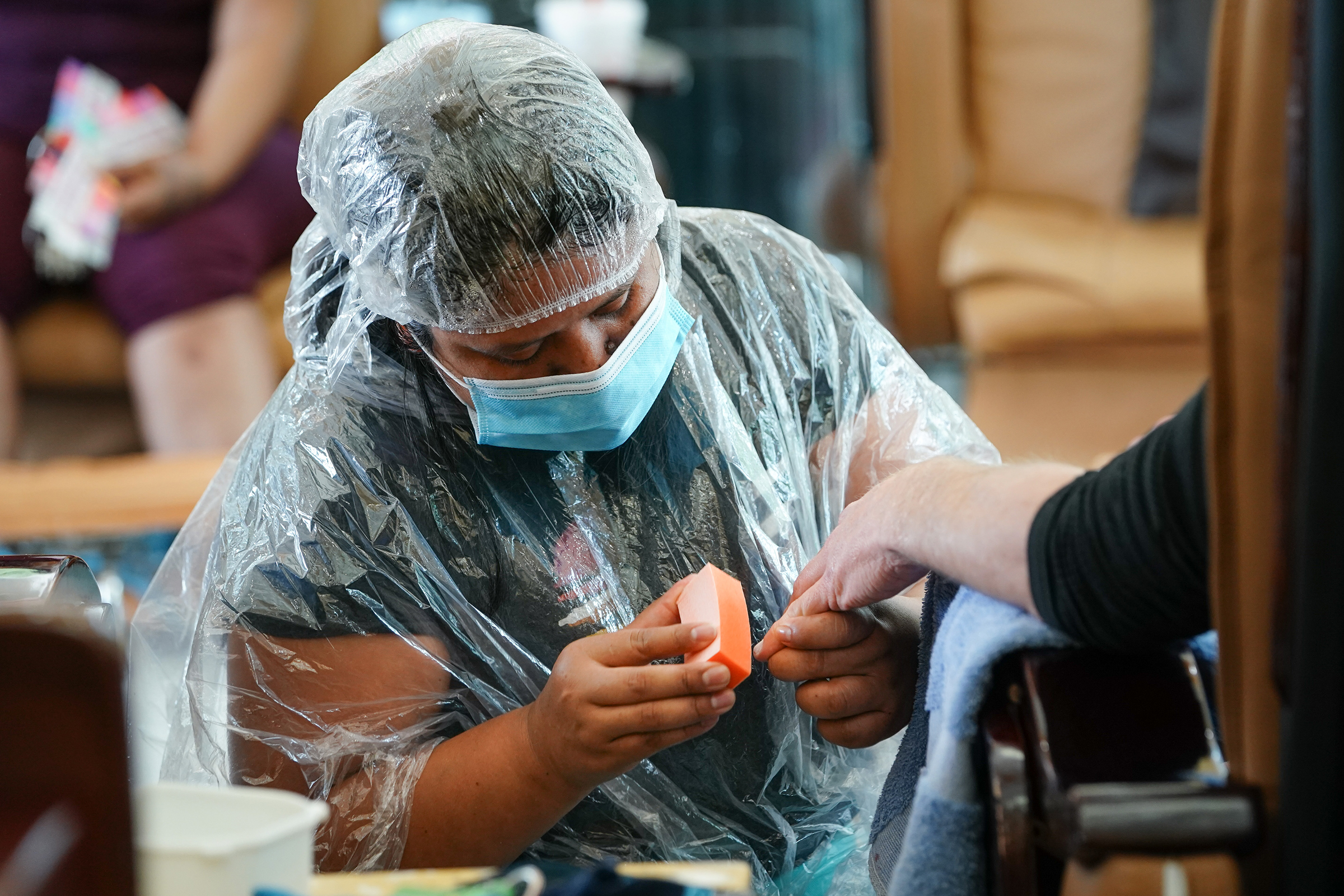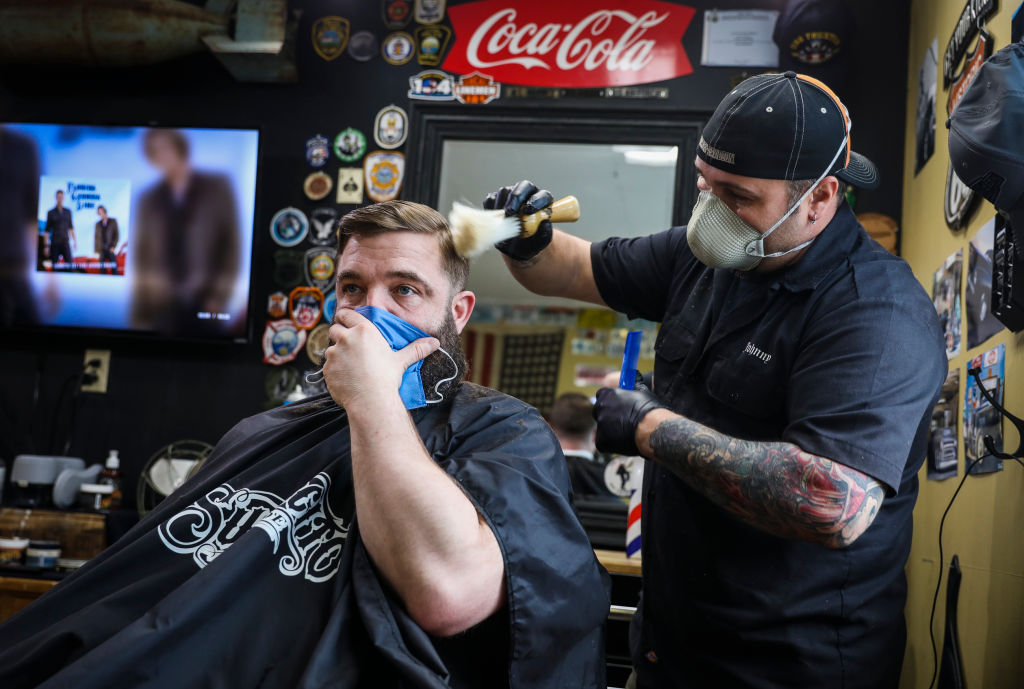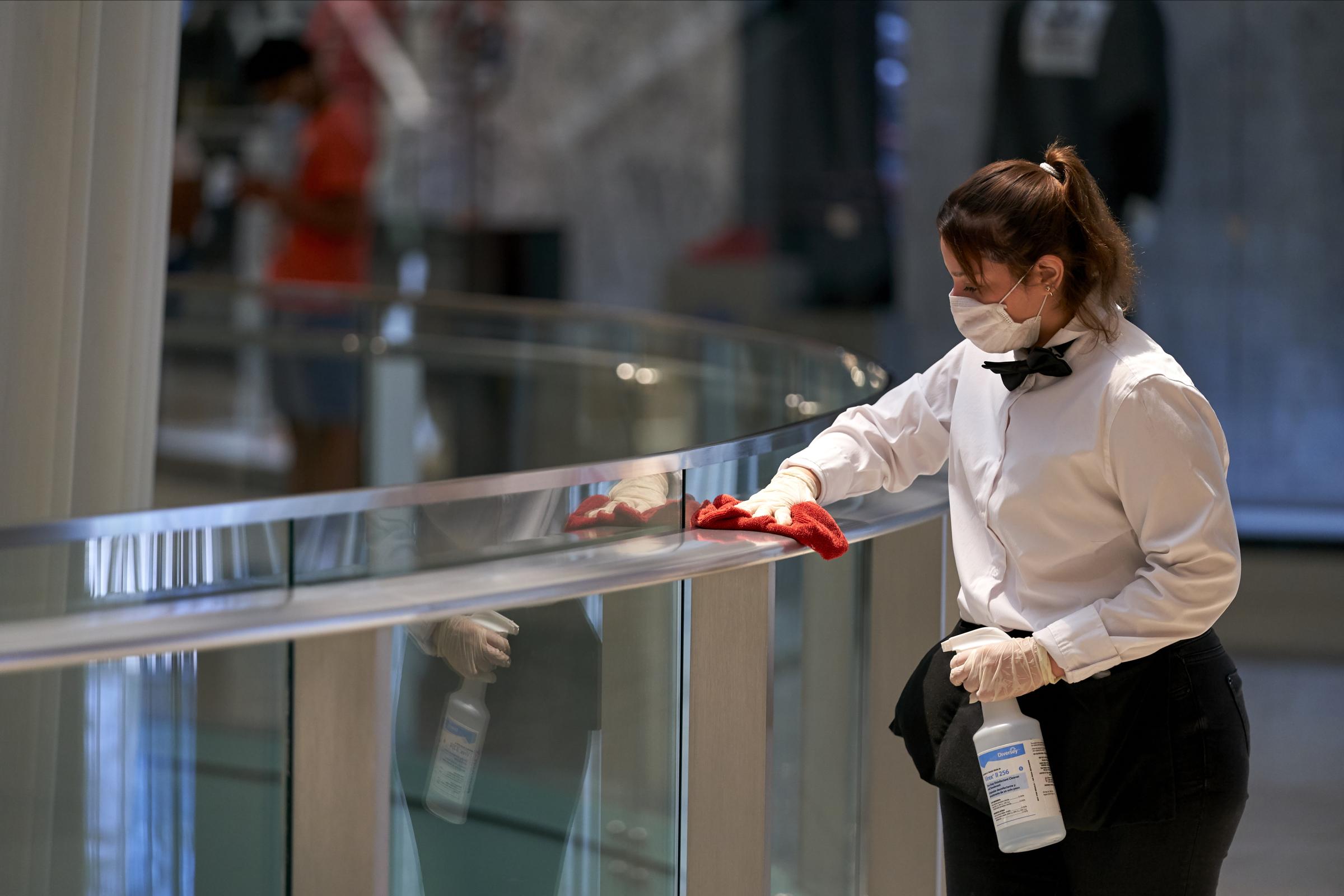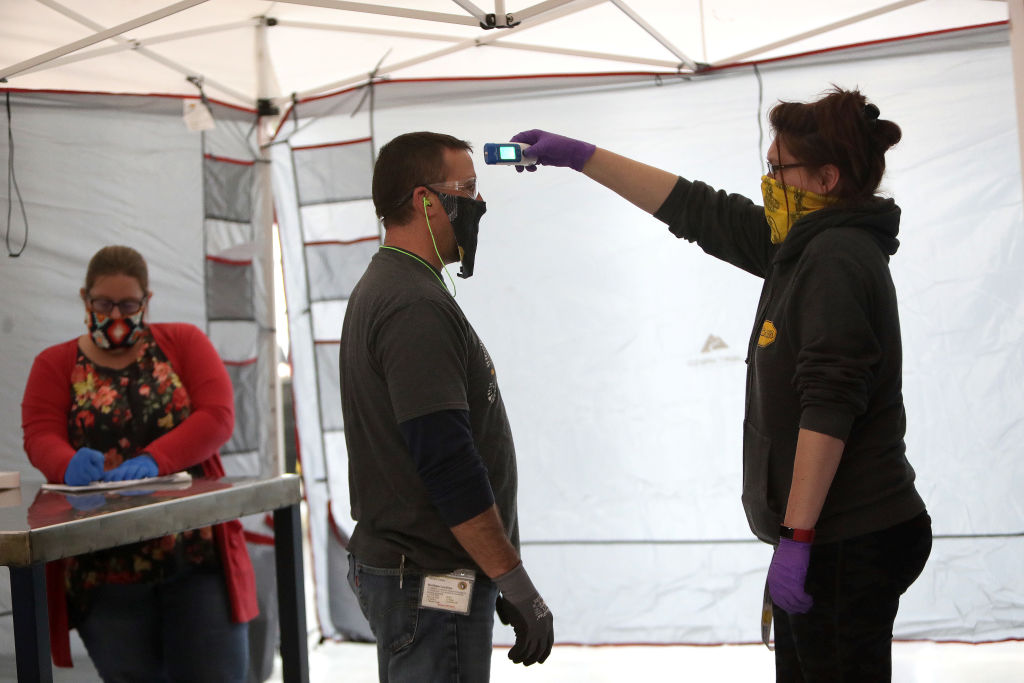
Raven Sterrett, a 27-year-old dental hygienist in Portland, Oregon, hasn’t gone to work in months. Governor Kate Brown suspended non-urgent medical procedures in mid-March, part of an effort to stem the spread of the novel coronavirus. But Brown reversed that order on May 1, and Sterrett’s boss asked her to return to work on May 11.
Sterrett’s employer Pham Dental Care had taken steps to follow the U.S. Centers for Disease Control and Prevention (CDC) guidelines to protect patients and staff, she tells TIME: ordering thermometers to test patients on arrival and acquiring personal protective equipment (PPE) for the staff. Still, she’s unsure if it’s safe to return — for herself, or her patients. Portland, after all, is a hotspot for COVID-19 cases in Oregon, according to a tracker from Johns Hopkins University.
The CDC says that certain dental tools can generate aerosols — tiny droplets that suspend in the air — from a patient’s mouth. Studies suggest COVID-19 can survive in aerosols for hours, although the CDC says there’s insufficient data to asses the risk of coronavirus transmission during dental procedures.
Sterrett asked her employers to delay elective procedures until June 15. But the office was “unwilling to compromise,” she says, and told her that if she didn’t return on May 11, her job would “no longer be available.” Pham Dental Care did not respond to TIME’s request for comment.
Despite calls to “reopen America” and resume some normal economic activity, coronavirus is still spreading widely across the U.S.. But some governors are reopening regardless of the public health risk, putting many workers in the same position as Sterrett. As of May 6, at least 23 states are partially re-opening their economies, despite warnings from public health experts that the U.S. lacks the testing and contact tracing capability to support such measures.
For workers like Sterrett, whether or not to go back to work can feel like an impossible decision. Should you refuse to return and be fired? Should you quit and risk losing unemployment benefits? In an unprecedented pandemic, what legal protections exist for workers?
That calculus will be different for workers in different states, experts say. “One of the challenges with understanding your rights as an employee is that each state has different rules and laws that can augment federal law,” Ann-Marie Ahern, a labor and employment lawyer in Cleveland, Ohio, tells TIME via email. “For instance, workers in California enjoy far more protection in the workplace than almost anywhere else in the U.S.”
Many states and cities have also expanded their usual worker protection laws during the pandemic. Michigan Gov. Gretchen Whitmer, for instance, issued an executive order in early April prohibiting companies from firing people who stay home for certain coronavirus related reasons. And the Texas Workforce Commission has issued guidance saying that Texans can receive unemployment benefits if they choose to not return to work for certain COVID-19-related reasons.
But as Ahern notes, underlying federal laws also offer some protections to American workers who feel unsafe returning to work amid the pandemic. Here’s what to know about those rights.
Can my employer fire me if I don’t return to the office?
Generally speaking, an employer can fire you if you refuse to come back to work. Most workers in the United States are employed “at will,” meaning that an employer can fire them for any reason that is not deemed illegal, explains James Brudney, a professor of labor and employment law at Fordham University School of Law in New York.
Being nervous about the coronavirus likely won’t be enough to legally protect you if you refuse to come back to work. Unless you have legal justification (or employer authorization), refusing to work will “constitute a resignation from employment,” says Sean Crotty, a labor and employment lawyer in Detroit.
Several federal laws may provide workers with that legal justification:
The Occupational Safety and Health Act (OSH Act)
The Occupational Safety and Health Act (OSH Act) grants workers the right to refuse to work if they believe workplace conditions could cause them serious imminent harm, Crotty says.
Employers must comply with the OSH Act’s General Duty Clause, which requires employers to guarantee their employees a workplace “free from recognized hazards that are causing or are likely to cause death or serious physical harm.” (States can also have their own OSH Act-approved workplace safety plans, which might have higher standards.)
But it may be tough to make a coronavirus-related case via the OSH Act.
“I would caution that [the General Duty Clause] is a very high standard,” Crotty says. “It will be particularly hard to meet if the employer is practicing social distancing and hygiene guidelines at the workplace.” Just saying that your employer isn’t doing enough likely won’t be enough to grant you protection, he adds.
If you think your workplace is unsafe because of the coronavirus, and you have concrete, specific examples, you can file a complaint with the Occupational Safety and Health Administration (OSHA). The OSH Act also includes an anti-retaliatory clause, meaning you can’t be fired or demoted for asserting your right to a safe workplace — though a worker must file that claim within 30 days of any alleged retaliation, Bill Hommel, a labor and employment lawyer in Tyler, Texas, explains.

The National Labor Relations Act (NLRA)
For employees in the private sector, if you and another worker feel your workplace is unsafe, and you both decide to not go into work for that reason, you’re protected under the National Labor Relations Act (NLRA) as essentially going on “strike for health and safety reasons,” says Ruben Garcia, a professor of labor and employment law at the University of Nevada, Las Vegas School of Law. You would both be legally engaging in what’s known as “concerted activity,” and the NLRA prohibits employers from retaliating against workers who are exercising their “concerted activity protections,” Garcia says. Your employer can hire someone to permanently replace you, but they legally can’t fire you.
“The NLRA, it’s about bargaining; about [making] changes at the workplace,” Garcia says.
If you are fired for walking off a job because you feel unsafe, you can go to your local chapter of the National Labor Relations Board (NLRB) and file a charge against your employer, Garcia explains. This law generally applies to all private sector employees regardless of whether they’re in a union. But some employees, including agricultural workers and domestic workers, are exempt.
However, as with an OSH Act complaint, your reasoning for feeling unsafe at work needs to be more specific than just general concern about COVID-19.
If you feel your workplace is particularly dangerous, you could possibly also be protected under the Labor Management Relations Act (LMRA). Kenneth G. Dau-Schmidt, a professor of labor and employment law at the Maurer School of Law at Indiana University, tells TIME that the LMRA states that if an employee walks off the job “because of abnormally dangerous conditions,” they’re protected from being fired. Importantly, unlike under the NLRA, workers who do this are not considered on strike, meaning their employer can’t hire someone else to permanently replace them. Dau-Schmidt cautions, however, that “abnormally dangerous” is a very high standard.
The Families First Coronavirus Response Act
The recently-passed Families First Coronavirus Response Act (FFCRA), which was intended to prop up the U.S. economy during the pandemic, includes some new or expanded worker protections that last through Dec 31, 2020.
If you work in the private sector for an employer with less than 500 employees, and have COVID-19, have COVID-19 symptoms or have been quarantined by a doctor or the government, you can take two full weeks of paid sick leave at your regular pay rate, subject to certain caps. And if you qualify for this paid leave, employers can’t make you come into the office during that time. (The FFCRA also includes two weeks of paid sick leave at two thirds’ pay to employees unable to work (or telework) because they are caring for for someone who has been quarantined.)

What if I have kids at home because of school and day-care closures?
The FFCRA extends up to 12 weeks of paid “expanded family and medical leave” at two thirds’ pay to employees unable to work (or telework) because they are caring for a child whose school or place of care is closed because of coronavirus. It’s subject to caps and requires that employees have been at their company for 30 days before taking leave.
However, Hommel says that employers with under 50 employees don’t need to offer the paid leave if they demonstrate it would “jeopardize the viability of the business as a going concern.”
What if I’m at higher risk of contracting COVID-19?
Individuals at greater risk from the coronavirus can still be required to return to work, but they “have special considerations,” Crotty tells TIME.
The Americans with Disabilities Act (ADA) requires employers to engage in an “interactive process” to try and provide reasonable accommodations for all employees with a disability who request one. The ADA defines a disability as “a physical or mental impairment that substantially limits one or more major life activities.” The Family and Medical Leave Act — which the FFCRA expanded — also states that eligible employees can take up to 12 weeks of unpaid job-protected leave for a serious health condition that makes them unable to perform their job, of if they’re caring for a family member when a serious health condition.
Read more: We Have to Decide Who Suffers Most in a Pandemic. That’s Complicated
While the ADA does not specifically list all impairments that qualify as a disability, many of the conditions that put an individual at a higher risk of contracting COVD-19, including diabetes, heart disease, lung disease, and immunodeficiency, ”are almost always ‘disabilities’ under the law,” Ahern says.
In order to claim protection under the ADA, Hommel says, it’s wise to have a medical professional make a determination that you have a particular condition. Then you should provide your employer with documentation of that condition alongside your ADA request.
If a doctor says you need to take a leave of absence for a medical condition, the ADA requires your employer to let you take that leave — unless it creates an undue hardship for your employer, says Ruth Major, a labor and employment lawyer in Chicago. The ADA does not specify a timeframe, but case law has imposed some limitations. The ADA also has anti-retaliation provisions that prevent your employer from taking action against you if you ask for accommodations under the law.
And if you’re pregnant, be aware that the Pregnancy Discrimination Act — which applies to employers with 15 or more employees — requires employers to “provide the same kind of accommodations to pregnant employees as disabled employees,” Ahern adds.
Still, keep in mind that the ADA can’t be used to stay home from work entirely.

Can my boss cut my hours or pay due to coronavirus concerns?
The short answer: yes. “Generally, employers in the U.S. have the right to determine an employee’s hours and compensation, and then it’s the employee’s right to accept those terms or not,” Ron Chapman, a labor lawyer at the firm Ogletree Deakins in Dallas, Texas, says via email.
However, most employers need to offer at least minimum wage. And for employees who are “exempt,” meaning they don’t usually qualify for overtime, “if the pay rate drops below the threshold, there may be liability for overtime,” Ahern writes.
If you have a collective bargaining agreement, you also might have a contractual right to set hours or a set pay, Crotty adds.
Can my boss check employees’ temperatures? Or make me report potential COVID-19 symptoms?
Once again, the short answer is yes. “Many jurisdictions are recommending and some are requiring employee temperature screenings and other measures,” Chapman writes.

The Equal Employment Opportunity Commission (EEOC), which enforces workplace anti-discrimination laws, has said employers can test employees before allowing them back into the workplace, as long as the Food and Drug Administration determines the tests being used are “accurate and reliable.” It has also said employers can take the temperatures of their employees, but must keep their health information confidential.
Employers must conduct temperature screenings in a way that’s safe and respectful for employees, Crotty says. “You want to let employees know about [the screening] in advance, you want to use no-contact thermometers, you want to have an appropriate person conducting the temperature checks and have that person garbed in the appropriate PPE. And if you’re in a situation where you have to send someone home, you want to be respectful and discreet about it.”
If I feel my workplace is unsafe, can I quit and collect unemployment benefits?
The federal CARES Act expanded unemployment benefits to people who might not have qualified in the past, such as gig workers (like Uber drivers) and people who are part-time employees or self-employed. It also granted Americans an additional 13 weeks of unemployment benefits and mandated that people on unemployment receive an additional $600 a week. (However, that extra money will end after July 31.)
Otherwise, unemployment regulations vary from state to state, experts tell TIME. Generally speaking, unemployment laws mandate that you can’t get unemployment if you quit, unless you have “good cause” for doing so, Crotty says. But “an unsafe working condition is a potential basis for claiming good cause,” he adds.
Among other factors, the state unemployment agency would consider the conditions under which you quit, whether you had raised any concerns to your employer, and whether the employer did anything to assess (or address) whether you actually were under “unsafe work conditions,” Crotty says.
Chapman adds that if an employee is in a high-risk category, “the unemployment agency may deem the act of quitting to be reasonable based on the unique circumstances,” although it would be a “case-by-case determination.”
If you plan on quitting because you think your workplace is unsafe, Major suggests that you first advocate your position to your employer, documenting your request and their response as evidence. But even copious notes of these interactions is no guarantee of qualifying for unemployment. “There’s always a possibility that they’re going to say, ‘we don’t think that that was unsafe.’ And so you voluntarily left and you’re not eligible for benefits,’” she says.
“Overall, quitting is risky for the employee when it comes to unemployment,” Crotty says. The employee “may ultimately prevail and show they had good cause, but there may be a delay in getting benefits while the issue is determined.” Furthermore, unemployment agencies are so backed up with claims right now that it might take a while before they “really dig in and start making determinations about eligibility,” he adds.

What other rights should I know about?
As Brudney explains, the Fair Labor Standards Act dictates that you have a right to be paid for all the work you do during all the hours you work. So if you end up working longer hours as a result of the pandemic, you’re supposed to be paid any appropriate overtime premiums you qualify for, he says.
Under the NLRA, most private sector employees also have the right to organize in a union, Dau-Schmidt tells TIME in an email. “Union workers have more opportunities to address safety issues and negotiate over changes in working conditions than non-union employees, and unions have the expertise to handle these problems well,” he writes.
Dau-Schmidt points to the example set by the United Food and Commercial Workers, which recently negotiated with grocery chain Kroger for more emergency leave, additional cleaning procedures and a pay increase. “Non-union employees can’t do that,” he says.
Ultimately, workers who are nervous about returning to work because of the virus should take the time to understand all the potential courses of action open to them, experts say.
“It is really important for people to understand all of their rights before making any employment law decisions, and to advocate for themselves in an informed manner,” Ahern says. Many of these laws are new, and “employees should not just assume that their employer knows or intends to comply with the law,” she says, adding: “Likewise, there are many circumstances that employees may face that may seem improper or irresponsible on the part of their employers, but may be very much legal.”
More Must-Reads from TIME
- Introducing the 2024 TIME100 Next
- The Reinvention of J.D. Vance
- How to Survive Election Season Without Losing Your Mind
- Welcome to the Golden Age of Scams
- Did the Pandemic Break Our Brains?
- The Many Lives of Jack Antonoff
- 33 True Crime Documentaries That Shaped the Genre
- Why Gut Health Issues Are More Common in Women
Write to Madeleine Carlisle at madeleine.carlisle@time.com